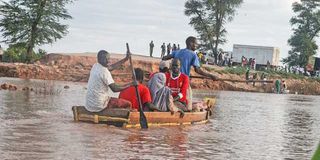How ethnic and political rows are jeopardising World Bank projects

Locals wade across a flooded section of the Nairobi-Garissa highway at Modogo in Tana River County in May. A World Bank project is seeking to resettle flood victims.
The county government risks losing out on two multibillion-shilling World Bank-funded projects due to ethnic and political divisions.
According to a letter from the State Department of Housing and Urban Development to the county Lands executive, the devolved unit is on the verge of being dropped from the second phase of the Kenya Informal Settlements Improvement Project (KISIP II), as well as from the Kenya Urban Support Programme, until it puts its house in order by approving development plans.
KISIP, a programme funded by the World Bank, has been supporting the planning and titling of 11 settlements in Garsen, Hola, Bura and Madogo towns.
The contract for the project’s consultant lapsed in April and cannot be extended until the county assembly approves the Local Physical Development Plan, putting the initiative’s progress in limbo.
“Owing to this, we are worried that the beneficiaries will not receive their ownership documents as earlier intended,” the national government says in its letter.
“We intend to exclude Tana River from [the project and also] advise our sister project, the Kenya Urban Support Programme, to halt implementation of projects in Tana River until the matter is resolved,” the letter added.
The projects seek to, among other things, resettle survivors of floods in safer grounds, develop new towns and expand existing ones.
County Lands Executive Mwanajuma Haribae said the developers need the land use plan, which has been gathering dust at the county assembly before they can proceed.
"The local physical development plan was submitted to the county assembly in October last year," she said, adding that the ethnic and political divisions fuelled misinformation and held the process hostage.
“This is not a one-man show; it’s not a personal project that some people should sabotage. We are working in the interest of the people of this county,” Ms Haribae said.
She lamented that, while the focus should be on the urbanisation agenda, much of it is instead leaning towards malicious incitement of ethnic emotions for personal gain.
As a result, beneficiary communities have been polarised against the entire development programme.
County Assembly Speaker Osman Galole said the House has been receiving memorandums regarding areas captured by the development plans and has been giving complainants an audience in respective house committees.
“We are a house of laws, and the law does not have to favour one side. Our work is to make sure that the executive does not trample upon the rights of citizens and also does not abuse the Constitution," he said.
Mr Galole added that the county assembly does not have any personal vendetta against the executive but only wants it to involve residents in development plans.
Meanwhile, a few leaders have urged their communities to ease their stand against the plan.
“We are much behind compared to other counties ... we must make a choice to move forward and catch up with others,” Cabinet Affairs Principal Secretary Idris Dokota told residents at a public forum recently.
Among projects threatened by the stalemate include the installation of solar power in 10 irrigation schemes under the World Food Programme, the Hola Urban Municipal Plan supported by UN-Habitat, the development of a spatial plan supported by the Food and Agriculture Organisation, and 150 low-cost housing units courtesy of Habitat for Humanity.





